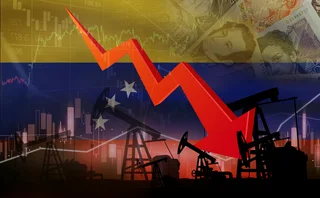Innovation of the year: Societe Generale
French bank adds OTC energy derivatives to its e-trading platform

Energy Risk Awards 2016
Electronic execution is a hot topic on bank commodity desks these days. While clients have historically carried out over-the-counter trades by phoning their dealers or sending them instant messages (IMs), a growing number of banks are launching screen-based trading platforms for OTC energy derivatives.
Against that backdrop, Societe Generale has been ahead of the curve. Last year, it became the second investment bank to add OTC energy to its single-dealer platform (SDP), called SG Markets. Clients say the French bank's e-trading system offers a wider range of energy products than those of Goldman Sachs or JP Morgan, although the space is evolving rapidly as dealers build out their platforms.
Launched in October 2015, SG Markets offers swaps on 32 energy underlyings, including various types of crude oil, gasoil, diesel and jet fuel. They are available in nine currencies: the Australian dollar, US dollar, euro, Swiss franc, Czech koruna, Swedish krona, Danish krone, British pound and Japanese yen. In 2016, SG plans to add options to the platform, along with soft commodities, natural gas and power. The bank has offered e-trading of metals since 2010.
Pawel Skala, a commodity risk manager at Switzerland-based engineering firm ABB, says SG Markets "simplifies the hedging and trading process and offers very competitive pricing". He describes it as a "quick, efficient and intuitive platform".
The launch of SG Markets was part of a broader effort to implement a unified e-trading platform across SG's capital markets business. Prior to the launch of SG Markets, the bank had a different electronic system in place, called SG Alpha, which had a common front-end but different back-end systems for different asset classes.
"There was a digital awakening, a big effort to really get everybody thinking about how the electronic side of things is going to affect our business going forward," says Jonathan Whitehead, London-based global head of commodities at SG. "There was a realisation that a whole bunch of people were working in silos around the organisation on e-trading platforms with different technologies, different ambitions and different looks and feel."
Since the launch of SG Markets, the bank estimates about 60% of total traffic has come from direct requests from customers, who use its ‘request for stream' function to see executable price quotes. The rest arises out of phone and IM interactions between clients and salespeople, who enter the trades into the system. But Whitehead says the bank expects more and more deals will move from voice to electronic execution.
"The view within the bank – and I'm sure this is the same anywhere else – is that the proportion of deals that are executed electronically is just going to continue to rise," he says.
One advantage of the new system, from SG's standpoint, is that it makes it easier for the bank to add new products or make tweaks in response to client feedback. For instance, one adjustment SG has made since launch is the addition of ‘uneven swaps', or multi-month swap trades in which the volumes vary from month to month.
The technology underpinning SG Markets also facilitates the process by which the bank lays off its risk each time a client enters a trade. In some cases, the system automatically lays off SG's risk by placing an offsetting trade, while in other cases – particularly for longer-dated trades in less liquid markets – a human element is still needed to warehouse and manage the risk. SG expects to continue to refine its proprietary algorithm that "interfaces between our human market-makers and the machine", says Francois Combes, SG's London-based deputy head of commodities and head of metals.
On the base metals side, SG Markets offers not just the ability to trade OTC, but it also allows clients to place buy and sell orders directly on the London Metal Exchange (LME) through its ‘direct market access' service. Prices for OTC contracts and exchange-listed contracts on the LME can be displayed side-by-side on the same screen, a function clients describe as useful.
Exchanges such as the LME – as well as Chicago-based CME Group and Atlanta-based Ice – have long offered screen trading, and the new crop of bank e-trading systems are, in a sense, competing with the exchange's platforms. But Combes says the custom-built solutions that banks can offer through SDPs give them an advantage over exchange platforms.
"If you want a suit, you either go to a shop, or you can go to a tailor; the SDP is the latter," he says. "But, importantly, the tailored suit is now pretty much the same price as a suit bought in a shop."
More on Risk management
Energy firms revisit CTRM systems as tech advances
Energy executives mull how to tap into the explosion of new technologies entering the risk space, but systems selection must consider future business needs, writes Yefreed Ditta at Value Creed
CRO interview: Brett Humphreys
Brett Humphreys is head of risk management at environmental markets specialist Karbone. He talks to Energy Risk about the challenges of modelling outcomes in unpredictable times and how he’s approaching the risks at the top of his risk register
How geopolitical risk turned into a systemic stress test
Conflict over resources is reshaping markets in a way that goes beyond occasional risk premia
Energy Risk Debates: the influence of risk culture
The panellists examine different risk cultures and discuss the risk manager’s role and influence in creating a risk culture
Energy Risk reaction: Venezuela and oil sanctions
Energy Risk talks to Rob McLeod at Hartree Partners about the energy risk implications of the US’s control of Venezuelan oil
CRO interview: Shawnie McBride
NRG’s chief risk officer Shawnie McBride discusses the challenges of increasingly interconnected risks, fostering a risk culture and her most useful working habits
Increasingly interconnected risks require unified risk management
Operational risk is on the rise according to a Moody's survey, making unified risk management vital, say Sapna Amlani and Stephen Golliker
Energy Risk Europe Leaders’ Network: geopolitical risk
Energy Risk’s European Leaders’ Network had its first meeting in November to discuss the risks posed to energy firms by recent geopolitical developments







